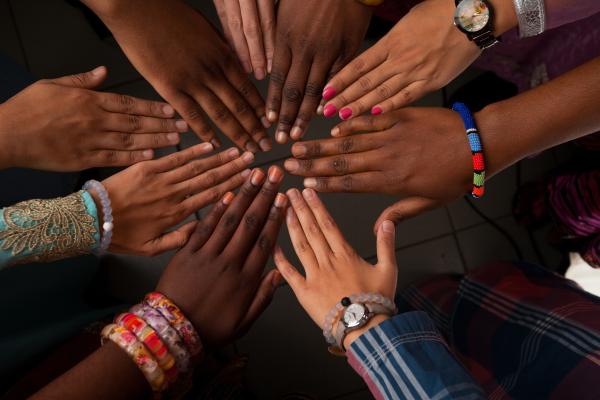GBV AoR Helpdesk Annual Report 2023
This annual report summarises the activity of the GBV AoR Helpdesk for the year 2023, including the type of queries the Helpdesk has responded to and the regions it has supported.
 Our global Gender-Based Violence (GBV) team provides strategic technical support to actors across the GBV ecosystem from donors to community-level women-led organisations. We are a multi-disciplinary team delivering programme design and implementation support, advocacy, research reports, MEL and helpdesk services.
Our global Gender-Based Violence (GBV) team provides strategic technical support to actors across the GBV ecosystem from donors to community-level women-led organisations. We are a multi-disciplinary team delivering programme design and implementation support, advocacy, research reports, MEL and helpdesk services.
Our team aspires to apply our feminist principles in all our work and to support sustained and transformative change. We partner with diverse stakeholders and we take an intersectional approach to our work on GBV prevention and response across development and humanitarian contexts.
Our work includes primary prevention programming, community-level response to GBV and SEAH, school-related GBV, GBV in Emergencies, Technology-Facilitated GBV, Violence against LGBTQI+ communities, and GBV in Climate and Economic programming.
Read more about our current work or search our extensive GBV Resource Library below.
This annual report summarises the activity of the GBV AoR Helpdesk for the year 2023, including the type of queries the Helpdesk has responded to and the regions it has supported.
This brief aims to assist FCDO humanitarian teams in integrating gender-based violence (GBV) considerations in humanitarian preparedness work in the Pacific region, particularly focusing on large-scale disasters, such as hurricanes, earthquakes, tsunamis, and volcanic eruptions. It provides a summary of regional data on GBV and emerging practices on GBV integration in preparedness planning in the Pacific.
The report highlights the increasing global adoption of Feminist Foreign Policies (FFPs) and Feminist Development Policies (FDPs) since Sweden's pioneering initiative in 2014. Despite growing support, the world remains off track to eliminate violence against women and girls (VAWG) by 2023, a critical barrier to achieving Sustainable Development Goals. The brief assesses how existing FFPs and gender strategies address VAWG prevention and response, emphasizing the need for systemic change beyond rhetoric.
This report addresses the issue of gender-based violence (GBV) in refugee camps, highlighting factors such as poverty, disrupted support systems, minority status, and limited access to essentials that contribute to increased risk. The report emphasizes the underlying root causes within camp settings, including gender inequality, patriarchal norms, alcohol/drug abuse, and controlling behaviors among men.
This policy brief summarises the pivotal role that refugee WLOs play in preventing and responding to GBV, as well as the systemic barriers they face. It aims to support specific and actionable pledges at the Global Refugee Forum.The insights are based on interviews with refugee WLOs in Kenya, Ukraine, South Sudan, Rwanda, Romania and Jordan, global organisations supporting refugee WLOs, and refugee leaders working with refugee women and youth networks. The brief also draws on a rapid desk review of the evidence.
This resource provides an overview of the Stopping Abuse and Female Exploitation Programme in Zimbabwe.
Gender-based violence is preventable and there is more evidence than ever before about what works. In recognition of the 16 Days of Activism against GBV, this latest infographic from the GBV AoR Helpdesk brings together key strategies for preventing GBV in emergencies.
This annotated bibliography includes key resources and guidance related to integrating GBV risk mitigation in programming and in foster care procedures for adolescent girls on the move in Europe, with specific focus on Italy. It also looks at relevant experiences and best practices related to this from European and other countries.
This learning brief provides an initial introduction to Artificial Intelligence (AI) and its links to Gender-Based Violence (GBV). It begins with an overview of key terms associated with AI relevant to GBV actors and summarizes current learning around how AI can exacerbate GBV in humanitarian settings. It then considers the ways in which AI may be used to address GBV, as well as the risks associated with the use of AI in GBV prevention and response.